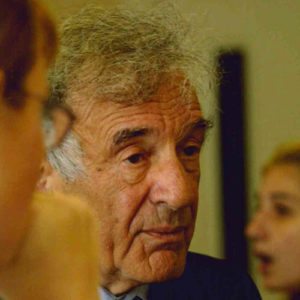In 1999, I was a senior at Eckerd College, and in Winter Term I took a World Lit class, with maybe 16 other students, taught by Dr. Carolyn Johnston and Dr. Elie Wiesel. We met every day, four days a week, for three weeks. Can you imagine? There aren’t many places in the world where young people receive the privilege—though it should be treated like the most necessary obligation—of exchanging ideas and intimacies with emissaries arisen out of the terrible, beautiful annals of human history.
My peers and I shared 20-some days in close company with Dr. Wiesel, and he talked not just to us but with us, and in his French-inflected Romanian accent, about his life and his writing and other writers he admired. My notes from that class are filled with snippets pulled from his conversations: “A story of despair does not need to be a message of despair. … The best writers don’t write to be read. They write to be reread. … War is history’s madness.”
In my memory of that class, we were all moved to tears on a daily basis. Toward the end of the three weeks, I had the gall to ask Dr. Wiesel if he’d write me a recommendation for graduate school—I was applying to BU, where he taught regularly along with another Nobel Laureate, Saul Bellow—and he said he’d consider it, but first he wanted to get to know me better. Could I visit him in his office?
During our sit-down, he only wanted to know about me. Did I have a job? I did; I waited tables at a fondue restaurant, The Melting Pot. Did I want to be a writer? I did; I’d started a novel for my senior thesis and hoped to one day publish it. What is a book? When I smiled and shrugged, he raised a finger, knobby and bent, and said, “A voice.”
I had countless questions and I couldn’t get in one. He asked where I lived and grew up. When I told him I lived with my mom and brothers in Sarasota and commuted an hour and a half to school every day. He told me I should listen to books on tape. “It is hard to understand when you are young,” he said, “but it is important for you to make the utmost of your time.”
He wound up writing me that recommendation, and I got waitlisted at BU. On a visit to Boston, I went to talk to the director of the BU master’s program, Leslie Epstein. I told him I wasn’t a fan of it’s-who-you-know, and that I was impressed by a school where a candidate with a recommendation from a Nobel Prize winner wasn’t a shoo-in. Epstein said, “Elie won the Peace Prize. Now had your recommendation come from Saul, who won for literature, you would’ve gotten in.”
Wherever Elie Wiesel is now, he surely isn’t resting, in peace or otherwise. He’s making the utmost of his time, even if his time is no longer ours. I wish I could say I took Dr. Wiesel’s advice, but selling a novel, finding a voice, has taken me nearly 20 years—St. Martin’s Press just published my debut, The Standard Grand, in April 2017. The novel is set largely in the Catskills, at an old Borscht Belt resort, and one of the characters, the old owner of the resort, Nehemiah “Chema” Teplitsky, is partly inspired by Dr. Wiesel. Some of Chema’s dialogue is cribbed verbatim from my notes of that class with Dr. Wiesel.
I’m sorry I took so long. I wish Dr. Wiesel were still around. I’d love to send him a copy. I’d include a note that reads, “Dear Dr. Wiesel, My apologies. My time hasn’t always been well spent, but thanks to you and your example, I’ve tried to make the utmost of what time I’ve been given … and even some time that I’ve stolen. You helped to teach me that when a person makes the utmost of his time, he’s really working to make the most of our time.”
—Jay Nicorvo ’99


